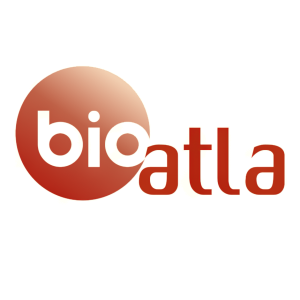BioAtla Presents Data from Ongoing Dose Escalation of BA3182, Dual-Conditionally Binding EpCAM x CD3 Bispecific T-cell Engager, in Patients with Treatment Refractory Metastatic Adenocarcinoma at the 2025 European Society for Medical Oncology (ESMO) Gastrointestinal Cancers Congress
Rhea-AI Summary
BioAtla (NASDAQ:BCAB) presented promising first-in-human data for BA3182, their dual-conditionally binding EpCAM x CD3 bispecific T-cell engager, at the 2025 ESMO Gastrointestinal Cancers Congress. The ongoing Phase 1 trial included 39 heavily pretreated patients with metastatic adenocarcinoma, receiving doses ranging from 0.0026 mg to 0.6 mg weekly.
Key findings showed five patients achieved objective tumor size reductions ranging from -8% to -25%, with two colorectal carcinoma patients showing prolonged progression-free intervals of 11 and 14 months. Adverse events were generally low-grade and manageable, with subcutaneous dosing showing an improved plasma profile compared to intravenous administration. The trial continues dose escalation at 1.2 mg weekly, with updated Phase 1 data expected in 2H2025.
Positive
- Five patients achieved tumor size reductions ranging from -8% to -25%
- Two colorectal carcinoma patients showed extended progression-free intervals of 11-14 months
- Adverse events were generally low-grade, transient, and manageable
- Subcutaneous dosing showed improved plasma profile versus intravenous administration
- BA3182 demonstrated potential to serve over one million patients globally
Negative
- Limited efficacy data with only 5 out of 39 patients showing tumor reductions
- Cytokine Release Syndrome observed in some patients with IV dosing
- Early hepatic transaminase elevations occurred in some patients
Insights
BioAtla's early phase 1 data shows promising safety profile and preliminary efficacy for its novel EpCAM x CD3 bispecific cancer therapy.
BioAtla has presented first-in-human data for BA3182, their dual-conditionally binding EpCAM x CD3 bispecific T-cell engager (TCE) designed to treat solid tumors. The preliminary results from this ongoing Phase 1 dose-escalation trial demonstrate several encouraging findings that warrant investor attention.
The drug's conditionally active biologic (CAB) technology appears to be addressing a critical challenge in cancer immunotherapy. By engineering BA3182 to preferentially bind in the acidic tumor microenvironment while minimizing activity in normal tissues, BioAtla is tackling the on-target/off-tumor toxicity that has previously limited EpCAM-targeting approaches. This is significant because EpCAM is robustly expressed across multiple adenocarcinomas, making it an attractive but historically difficult target.
The safety profile appears manageable at this early stage, with primarily low-grade, transient adverse events. Cytokine release syndrome (CRS) was observed only with intravenous administration prior to prophylactic tocilizumab use. The company's pivot to subcutaneous administration shows improved pharmacokinetics with delayed and lower maximum concentration, potentially enhancing the therapeutic window.
Efficacy signals, while preliminary, show promise with 5 patients achieving objective tumor size reductions ranging from -8% to -25% across different cancer types. Particularly noteworthy are the extended progression-free intervals of 11 and 14 months in two colorectal carcinoma patients – impressive durations in a heavily pretreated population (median of 3 prior therapy lines).
The ongoing dose escalation to 1.2 mg suggests the maximum tolerated dose has not yet been reached, which may allow for higher dosing and potentially improved efficacy. With potential applications across multiple adenocarcinomas including colorectal, breast, lung, and pancreatic cancers, BA3182 could address a substantial patient population that BioAtla estimates at over one million patients globally.
While these early results are promising, investors should recognize that Phase 1 data is preliminary by nature. The small patient sample (
Adverse events were generally low-grade, transient, and readily manageable
Achieved preliminary evidence of prolonged tumor control and tumor reductions in heavily pretreated adenocarcinoma patients
Dose escalation now continuing at 1.2 mg weekly by subcutaneous flat dosing
SAN DIEGO, July 03, 2025 (GLOBE NEWSWIRE) -- BioAtla, Inc. (Nasdaq: BCAB) (the “Company” or “BioAtla”), a global clinical-stage biotechnology company focused on the development of Conditionally Active Biologic (CAB) antibody therapeutics for the treatment of solid tumors, today presented first-in-human data in a poster titled “Preliminary Results from a First-in-Human Phase 1 Study of a Dual-Conditionally Binding CAB-EpCAM x CAB-CD3 Bispecific T-cell Engager, BA3182, in Patients with Treatment Refractory Metastatic Adenocarcinoma” at the European Society for Medical Oncology (ESMO) Gastrointestinal Cancers Congress being held in Barcelona, Spain from July 2–5, 2025.
In the ongoing Phase 1 dose-escalation clinical trial, as of June 20, 2025, 39 patients with heavily pretreated metastatic adenocarcinoma were dosed in cohorts ranging from 0.0026 mg to 0.6 mg BA3182 QW, with either 0, 1, or 2 priming dose(s) delivered four to seven days prior to treatment dosing. The primary objectives of this trial are to characterize safety and tolerability with escalating doses for determining efficacious dose(s) for guiding the selection of the recommended Phase 2 dose (RP2D). Secondary objectives include evaluation of preliminary antitumor activity in different cancer types, pharmacokinetics, and any potential immunogenicity.
Robust expression of EpCAM among adenocarcinomas of the colon, stomach, pancreas, biliary tract, lung, breast, prostate, and thyroid makes it a compelling bispecific T-cell engager (TCE) target when reliably restricting antibody binding to the tumor microenvironment (TME). Preclinical studies using dual CAB BA3182 demonstrated potent antitumor activity in a human colorectal carcinoma xenograft model with a greater than a 100-fold improvement in the therapeutic index compared to non-CAB EpCAM x CD3 variants.
“BA3182, our dual-CAB EpCAM x CD3 bispecific TCE, was developed to drive maximal binding in the acidic tumor microenvironment, effectively eliminating binding in healthy tissues, and thereby avoiding on-target, off-tumor toxicities observed by others in previous attempts with EpCAM targeting antibodies,” said Jay M. Short, Ph.D., Chairman, Chief Executive Officer and co-founder of BioAtla. “We are observing encouraging preliminary tumor reductions and a reassuring safety profile and continue to dose escalate. BA3182 has the potential to serve over one million patients globally and could be a best-in-class bispecific TCE for multiple solid tumor types.”
Data highlights from the poster include:
- Patients (n=39) were heavily pretreated having received a median of 3 prior lines of therapy.
- Tumor types included a variety of adenocarcinomas including adenoid cystic carcinoma, breast, cholangiocarcinoma, colorectal, esophagus, gallbladder, lung, ovarian, and pancreas.
- Patients with colorectal carcinoma constituted
56% of enrolled patients. - Intravenous (IV) formulation of BA3182 was administered to 17 patients at doses of 0.0026 mg to 0.032 mg weekly and the subcutaneous (SC) formulation was administered weekly to 22 patients at doses of 0.032 mg to 0.6 mg; reported results include data from a June 20, 2025 cutoff.
- Compared with IV dosing, plasma BA3182 levels associated with SC dosing showed an improved profile (delayed and lower maximum concentration) with similar trough concentrations.
- Adverse events were generally low-grade, transient, and readily manageable.
- Cytokine Release Syndrome that readily resolved was only observed with IV dosing prior to implementation of prophylactic tocilizumab for first treatment dose: G1 (n=2) and G2 (n=1).
- Early, transient, asymptomatic G1 to G3 hepatic transaminase elevations resolved without delaying next weekly treatment dose (IV and SC, n=8 total).
- Five patients achieved objective tumor size reductions: colorectal carcinoma (-
8% and -10% ), breast adenocarcinoma (-11% ), cholangiocarcinoma (-13% ), and non-small cell
lung cancer (-25% ). - Prolonged progression-free intervals observed in 2 colorectal carcinoma pts: 11 months and 14 months.
- Dose escalation actively continues at 1.2 mg flat dosing; updated Phase 1 data are anticipated 2H2025.
A copy of the presentation materials can be accessed on the “Publication” section of the Company’s website at www.bioatla.com once the presentation has concluded.
About BA3182 (CAB-EpCAM x CAB-CD3 Bispecific T-cell Engager Antibody)
BioAtla is developing BA3182 as a potential anticancer therapy for patients with advanced adenocarcinoma, which are the largest group of cancers and most often occur as solid tumors in lung, breasts, colon, prostate, and pancreas. These cancers develop from glandular epithelium that forms the lining of many surfaces throughout the body and normally function as a barrier to protect underlying tissues and organs from damage and infections. EpCAM (Epithelial Cell Adhesion Molecule) is a ubiquitous protein found at high levels on the surface of epithelial cells, which create tight junctions, thereby forming a protective barrier. EpCAM expression is further increased in adenocarcinomas and is therefore expressed on the majority of human cancers. BA3182 is a (CAB) EpCAM x (CAB) CD3 bispecific T cell engager antibody that contains two binding sites for EpCAM and two binding sites for CD3ε. CD3 is a protein complex found on the surface of T cells and plays a vital role in T cell activation and immune response. The binding sites for EpCAM and CD3ε have been designed to bind their respective targets specifically and reversibly under the conditions found in the TME and to have reduced binding outside of the TME. The CAB selective binding to both the CAB EpCAM and CAB CD3ε arms form an immunological synapse which is required to activate the T cell engagement against the tumor, thus enabling the combined selectivity of each CAB binding arm in the bispecific antibody. BioAtla continues to advance the ongoing Phase 1 study to evaluate the safety, pharmacokinetics, and efficacy of BA3182 in advanced adenocarcinoma patients.
About BioAtla®, Inc.
BioAtla is a global clinical-stage biotechnology company with operations in San Diego, California, and in Beijing, China through its contractual relationship with BioDuro-Sundia, a provider of preclinical development services. Utilizing its proprietary CAB platform technology, BioAtla develops novel, reversibly active monoclonal and bispecific antibodies and other protein therapeutic product candidates. CAB product candidates are designed to have more selective targeting, greater efficacy with lower toxicity, and more cost-efficient and predictable manufacturing than traditional antibodies. BioAtla has extensive and worldwide patent coverage for its CAB platform technology and products with greater than 780 active patent matters, more than 500 of which are issued patents. Broad patent coverage in all major markets includes methods of making, screening and manufacturing CAB product candidates in a wide range of formats and composition of matter coverage for specific products. To learn more about BioAtla, Inc., visit www.bioatla.com.
Forward-looking statements
Statements in this press release contain "forward-looking statements" that are subject to substantial risks and uncertainties. Forward-looking statements contained in this press release may be identified by use of words such as "anticipate," "expect," "believe," "will," "may," "should," "estimate," "project," "outlook," "forecast" or other similar words. Examples of forward-looking statements include, among others, statements we make regarding BioAtla’s business plans and prospects, whether our clinical trials will support registration, the potential regulatory approval path for BA3182, the ability to add higher dose cohorts to the ongoing Phase 1 dose-escalation clinical trial of BA3182 and the potential for BA3182 to address the treatment refractory metastatic adenocarcinoma population. Forward-looking statements are based on BioAtla's current expectations and are subject to inherent uncertainties, risks and assumptions, many of which are beyond our control, difficult to predict and could cause actual results to differ materially from what we expect. Further, certain forward-looking statements are based on assumptions as to future events that may not prove to be accurate. Factors that could cause actual results to differ include, among others: factors that raise substantial doubt about our ability to continue as a going concern and that we will need additional funding to continue development of our CAB technology platform and our CAB product candidates; potential delays in clinical and preclinical trials; the uncertainties inherent in research and development, including the ability to meet anticipated clinical endpoints, commencement and/or completion dates for clinical trials, regulatory submission dates, or regulatory approval dates, as well as the possibility of unfavorable new clinical data and further analyses of existing clinical data; whether regulatory authorities will be satisfied with the design of and results from the clinical studies or take favorable regulatory actions based on results from the clinical studies; our dependence on the success of our CAB technology platform; our ability to enroll patients in our ongoing and future clinical trials; the successful selection and prioritization of assets to focus development on selected product candidates and indications; our ability to form collaborations and partnerships with third parties and the success of such collaborations and partnerships; our reliance on third parties for the manufacture and supply of our product candidates for clinical trials; our reliance on third parties to conduct our clinical trials and some aspects of our research and preclinical testing; potential adverse impacts due to geopolitical or macroeconomic events outside of our control, including health epidemics or pandemics; and those other risks and uncertainties described in the section titled "Risk Factors" in our Annual Report on Form 10-K filed with the Securities and Exchange Commission (the “SEC”) on March 27, 2025, our Quarterly Report on Form 10-Q filed with the SEC on May 6, 2025 and our other reports as filed with the SEC. Forward-looking statements contained in this press release are made as of this date, and BioAtla undertakes no duty to update such information except as required under applicable laws.
Internal Contact:
Richard Waldron
Chief Financial Officer
BioAtla, Inc.
rwaldron@bioatla.com
858.356.8945
External Contact:
Mike Moyer
LifeSci Advisors, LLC
mmoyer@lifesciadvisors.com







